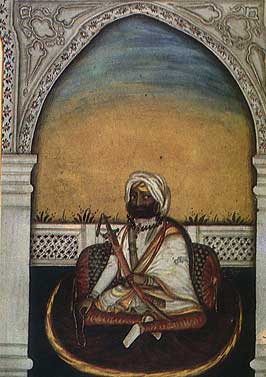Jawahar Singh (wazir)
Jawahar Singh (Wazir) was a prominent figure in the history of the Sikh Empire, particularly during the reign of Maharaja Ranjit Singh. As a wazir, or minister, in the Sikh court, Jawahar Singh played a crucial role in the administration and military campaigns of the empire. His contributions to the Sikh state, both in terms of governance and military achievements, have been noted by historians and scholars of the period.
Early Life and Background[edit | edit source]
Jawahar Singh's early life is shrouded in mystery, with little documented evidence about his origins and upbringing. However, it is known that he rose to prominence in the Sikh Empire through his skills in administration and his military prowess. His loyalty and service to Maharaja Ranjit Singh earned him the position of wazir, making him one of the most powerful men in the empire.
Career[edit | edit source]
As wazir, Jawahar Singh was involved in several key aspects of governance, including finance, justice, and military affairs. He was known for his administrative skills and his ability to manage the empire's resources effectively. His tenure saw the implementation of several reforms that strengthened the central administration and improved the efficiency of the government.
In addition to his administrative duties, Jawahar Singh also played a significant role in the military campaigns of the Sikh Empire. He was involved in planning and executing several battles that expanded the territory of the empire. His military strategies and leadership on the battlefield contributed to the Sikh Empire's reputation as a formidable power in the region.
Legacy[edit | edit source]
Jawahar Singh's legacy is a testament to his contributions to the Sikh Empire. He is remembered as a skilled administrator and a brave warrior who played a pivotal role in the empire's history. His efforts in strengthening the administration and expanding the territory of the Sikh Empire have been recognized by historians as key factors in the empire's success during its golden age.
Death and Aftermath[edit | edit source]
The circumstances of Jawahar Singh's death are not well-documented, but it is believed that he died while still in service to the Sikh Empire. Following his death, the empire faced several challenges, including internal strife and external threats, which eventually led to its decline. However, Jawahar Singh's contributions to the empire during his lifetime left a lasting impact on its history.
Search WikiMD
Ad.Tired of being Overweight? Try W8MD's physician weight loss program.
Semaglutide (Ozempic / Wegovy and Tirzepatide (Mounjaro / Zepbound) available.
Advertise on WikiMD
|
WikiMD's Wellness Encyclopedia |
| Let Food Be Thy Medicine Medicine Thy Food - Hippocrates |
Translate this page: - East Asian
中文,
日本,
한국어,
South Asian
हिन्दी,
தமிழ்,
తెలుగు,
Urdu,
ಕನ್ನಡ,
Southeast Asian
Indonesian,
Vietnamese,
Thai,
မြန်မာဘာသာ,
বাংলা
European
español,
Deutsch,
français,
Greek,
português do Brasil,
polski,
română,
русский,
Nederlands,
norsk,
svenska,
suomi,
Italian
Middle Eastern & African
عربى,
Turkish,
Persian,
Hebrew,
Afrikaans,
isiZulu,
Kiswahili,
Other
Bulgarian,
Hungarian,
Czech,
Swedish,
മലയാളം,
मराठी,
ਪੰਜਾਬੀ,
ગુજરાતી,
Portuguese,
Ukrainian
Medical Disclaimer: WikiMD is not a substitute for professional medical advice. The information on WikiMD is provided as an information resource only, may be incorrect, outdated or misleading, and is not to be used or relied on for any diagnostic or treatment purposes. Please consult your health care provider before making any healthcare decisions or for guidance about a specific medical condition. WikiMD expressly disclaims responsibility, and shall have no liability, for any damages, loss, injury, or liability whatsoever suffered as a result of your reliance on the information contained in this site. By visiting this site you agree to the foregoing terms and conditions, which may from time to time be changed or supplemented by WikiMD. If you do not agree to the foregoing terms and conditions, you should not enter or use this site. See full disclaimer.
Credits:Most images are courtesy of Wikimedia commons, and templates, categories Wikipedia, licensed under CC BY SA or similar.
Contributors: Prab R. Tumpati, MD



